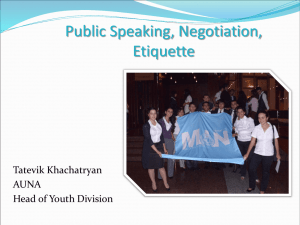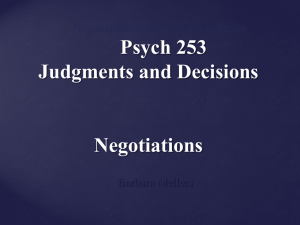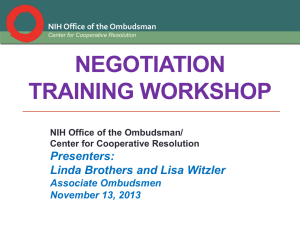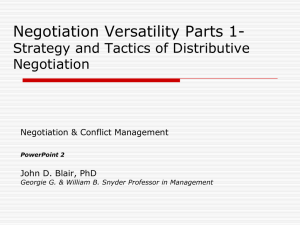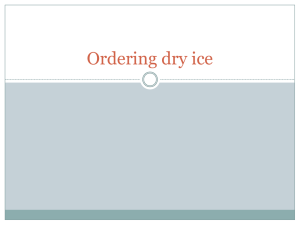Exercise on negotiation
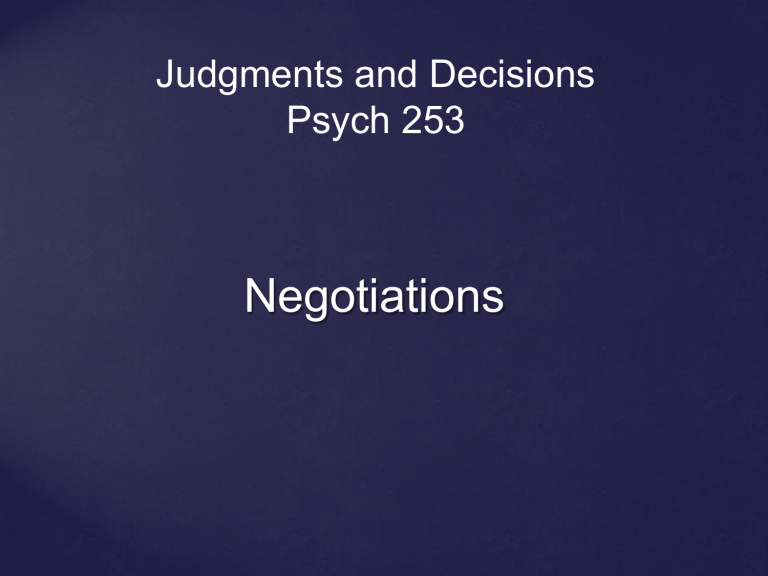
Judgments and Decisions
Psych 253
Negotiations
Negotiation: A process by which two or more people come to agreement on how to allocate scarce resources.
Parties are interdependent; neither has complete power to choose
The process is a decision, not a contest of wills
Common Problems in Negotiation
Leaving money on the table (lose-lose negotiation)
Settling for too little (winner’s curse)
Walking away from the table (hubris)
Settling for terms that are worse than your current situation (agreement bias)
Why Are People Ineffective Negotiators?
Absence of relevant and diagnostic feedback
Search for confirming information
Egocentrism
Satisficing
Versus Optimizing
Self-reinforcement
Fear of change and experimentation
Myths
Good negotiators are born, not made
Experience is a great teacher
Good negotiators are risk-takers
Good negotiators rely on intuition
Today’s Negotiation: Synertech-Dosagen
Assign Roles
Read ONLY your materials (do not look at your partner’s materials)
You have 5 minutes to read, think, and prepare
You have 15 minutes to negotiate and you can do this outside of the classroom.
But come BACK in 20 minutes with the results of your negotiation on the handout .
Relevant Facts
Dosagen bought the plant 3 years ago for
$15 M (but sellers was distressed)
Plant appraised 2 years ago at $19 M with
5% real estate decline since then
Similar but newer plant sold for $26 M nine months ago
Key Negotiation Principles
Best Alternative To a Negotiated Agreement
(BATNA)
Reservation price
Bargaining zone
Aspiration level
Key Negotiation Principles
Best Alternative To a Negotiated Agreement
(BATNA)
Reservation price
Bargaining zone
Aspiration level
BATNA Tips
Know your BATNA
Do not think of your BATNA in aggregate terms
Improve your BATNA before you negotiate
“Fall in love with three” rule
You want your counterpart to think you have a good BATNA
Key Negotiation Principles
Best Alternative To a Negotiated
Agreement (BATNA)
Reservation price
Bargaining zone
Aspiration level
Reservation Price
Reservation Price is your bottom line
The point at which you are indifferent to whether you achieve a negotiated agreement or walk away. Beyond the reservation price, you prefer no agreement.
Reservation Price is equal to your BATNA +/- other issues that make you want to do the deal
e.g., opportunity costs, switching costs, ego, miscellaneous preferences
Define your reservation price before negotiating
Learn your opponents’ reservation price, if possible
Should You Reveal your BATNA and
Reservation Price?
Do not reveal your reservation price!!!
One of the critical pieces of information in a negotiation is the other party’s reservation point. If it becomes known to one party, the negotiator can push for a resolution that is only marginally acceptable to the other party.
Do not state ranges
Reveal your BATNA only when:
You are nearing an impasse
You have a strong BATNA
You want to make an agreement in the current negotiation
Key Negotiation Principles
Best Alternative To a Negotiated
Agreement (BATNA)
Reservation price
Bargaining zone
Aspiration level
The Negotiation Bargaining Zone
Buyer’s Target Price
Buyer’s Reservation Price (B
R
)
(e.g., $25M)
Seller’s Reservation Price (S
R
)
(e.g., $17M)
Seller’s Target
• The bargaining zone is the space between the buyer’s reservation price
(B
R
) and the seller’s reservation price (S
R
) – that is, the zone of possible agreement.
• If B
R
> S
R
, then a Positive Bargaining Zone exists. The zone of agreement is from S
R to B
R
(e.g., $8M).
A Negative Bargaining Zone
Seller’s Reservation Price (S
R
)
(e.g., $25M)
Buyer’s Reservation Price (B
R
)
(e.g., $17M)
If B
R
< S
R
, then there is no zone of possible agreement.
Key Negotiation Principles
Best Alternative To a Negotiated Agreement
(BATNA)
Reservation price
Bargaining zone
Aspiration level
$23.5
$23.0
$22.5
$22.0
$21.5
$21.0
$20.5
Aspiration Level
Final Price (in millions)
Buyer focused on
BATNA
Buyer focused on aspiration level
Distributive Bargaining Tactics
First offers
Concessions
Persuasion
First Offers
Who made the first offer?
How did the first offer affect the negotiation?
First Offers in Synertech-Dosagen
Final Price (in millions)
$25
$24
$23
$22
$21
$20
$19
$18
$17
Buyer made first offer Seller made first offer
• There is a high correlation between the first offer and the final price
• Counteroffers and later concession behavior less predictive of final price
The First Offer
How high should the first offer be?
“As high as you can go without embarrassing yourself in front of a respected 3 rd party” (Fisher & Ury, 1991)
What’s embarrassing? What’s optimistic? Learn the market!
Only let the other party make the first offer when
You have no information
It is inappropriate to do so (e.g., job negotiations)
Immediately re-anchor if your counterpart makes the first offer
Concessions & Persuasion
Allow yourself room to make concessions
Don’t go in with a “first and final offer”
Make bi-lateral, not uni-lateral concessions
Make your concessions smaller as you approach your goal
Use objective rationale to support your argument
Again, learn the market
Distributive Negotiation Strategies
Know your BATNA
Strengthen your BATNA whenever possible
Know your reservation price
Do not reveal your reservation price
Research the other party’s BATNA/reservation price
Define your aspiration level and focus on that
Make first offers whenever possible
If they make the first offer, immediately re-anchor
Watch how you are making concessions
Prepare objective rationale for your arguments

